Attendance
Our expectations
We have high expectations of student attendance and are committed to ensuring high levels of attendance for all. We believe that all our students deserve the opportunity to secure qualifications with the highest grades, so that they may forge opportunities for themselves in the future equitable with those forged by students across the country -- and we know that strong attendance is necessary for this to be achieved. And this has become even more important given the significant and unprecedented disruption to our students' education caused by the coronavirus pandemic. To this end, our attendance policies, procedures and initiatives are rigorously implemented throughout the academic year.
Why strong attendance is important
94.5%, the national average attendance rate in 2019, may sound high, but this translates to 50 lessons missed. The disruption to a student's learning that such absence has the potential to have is significant, as was recognised as far back as 1869: 'To profit by school exercises, scholars must be present. The loss of a few weeks, or even days sometimes, when a class is learning principles essential to its future course, will greatly impair, if not entirely interrupt, the progress of a pupil' (Tash, T (1869), 'School Attendance’, The Maine Journal of Education, Vol.3, No.11, pp402-406).
The correlation between students' attendance to school and their achievement is well documented. For example, a 2019 study by the National Foundation for Educational Research (NfER) found that 'pupil absence rates are strongly associated with KS4 outcomes' and, that this 'association between being absent from school and KS4 outcomes is worse for disadvantaged pupils than their more affluent peers'. Moreover, 'the association is particularly strong compared to all other factors' that influence students' achievement. Evidence on the strength of the relationship between school absence and student achievement analysed by the Centre for Education Policy & Equalising Opportunities from University College London's Institute of Education (2020), has also shown that reducing student absence has a positive effect on achievement and is likely to reduce achievement gaps between high and low income students. Moreover, improving communication with parents, carers and guardians via text or email is an effective way of reducing such absences.
And this situation is evident at the College: For the three-year period 2017-2019, students who attended school at the national average rate (94.5% in 2019) or above achieved exam results that translated to a Progress 8 score of +0.64, with the Progress 8 score for students from low income families +0.72. This means that students in the College who attended school at least at the national average rate, achieve one grade higher in 6-7 (out of 10) exams than other students, on average, nationally. Conversley, students who were persistently absent (i.e, for at least 10% of the time) over the three-year period 2017-2019, achieved on average one grade lower in each of their exams than students, on average, nationally. The visualisations below show how attendance affected students' achievement in GCSE examinations at the College in 2019.
Students achieving at least grade 5 in GCSE English and mathematics at OC 2019
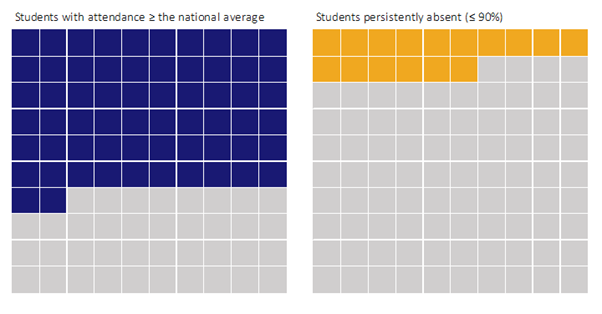
Average GCSE grades at OC 2019
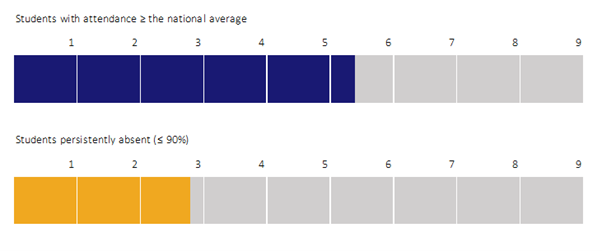
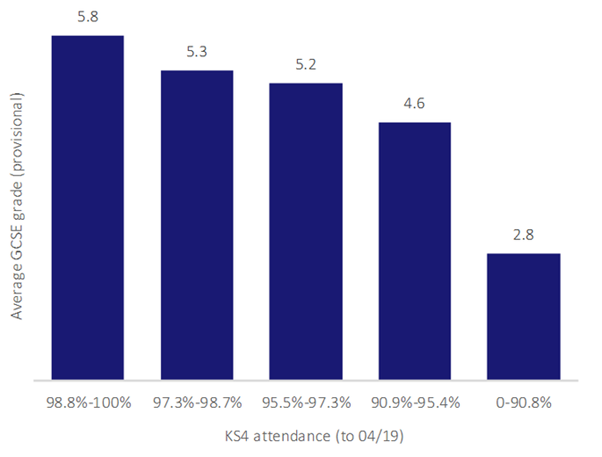
Monitoring students' attendance
Given the clear impact that students' attendance has on their achievement, and thus, on their future life chances, we monitor our students' attendance closely and regularly, and intervene quickly. Our students' attendance is banded as shown in the 'Attendance Diamond' below, in terms of relative risks to achievement. We would not expect any student’s attendance to fall below 96%, because students whose attendance remains between 96% and 100% are in the best position to achieve the highest grades in their GCSE and A-Level examinations. We intervene early and quickly if attendance falls: Students are progressively less likely to achieve good grades at GCSE the more their attendance falls.
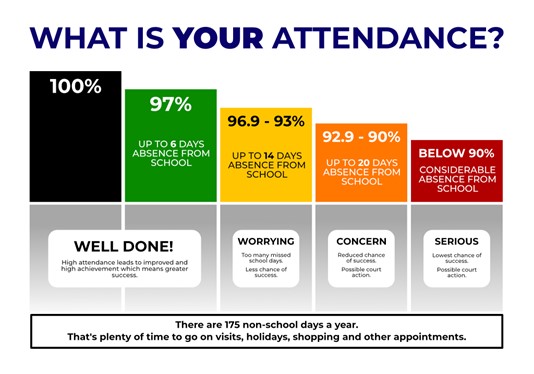
Our Response to Students' Absence
We adopt a gradual escalation of intervention, as outlined below:
- Text message and/or email home for all unnotified absences from attendance officer – Tine Casbolt
- Tutor conversation with Tutor contact home
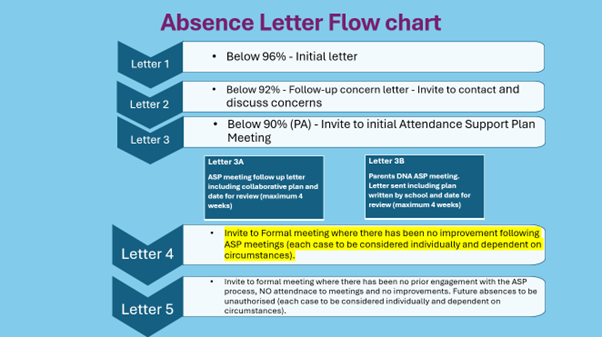
- Referral to the Education welfare and inclusion officer (EWIL) – Jaye McDonald
It is important that parents, carers and guardians understand that failure to ensure regular and punctual school attendance may result in the issuing of a penalty notice under Anti-Social Behaviour Act 2003, and/or prosecution under section 444 of the Education Act 1996. Information about School Attendance Orders can be accessed here.
Early Help

Reporting Absence
In the rare occasion that a student cannot attend school, parents, carers or guardians should contact the College for each day of non-attendance.
Please report any non-attendance by 7:45am. Contact may be made via telephone 01837 650911 or email, at attendance@okehamptoncollege.devon.sch.uk.
We comply with DfE guidance and will not grant any leave of absence during term time unless there are exceptional circumstances. Parents, carers and guardians should note that such leave is very unlikely to be granted for the purposes of a family holiday. Parents, carers or guardians wishing to request that a future absence or period of absence be authorised should complete this form.
For More Information see below






